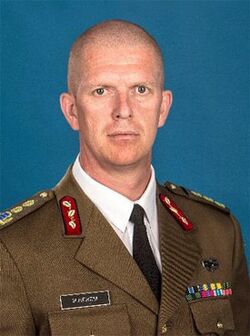Vedran Kučina
Vedran Kučina | |
|---|---|
 Kučina in 2016 | |
| Born | 2 November 1960 Sharchevo, Syara |
| Allegiance | |
| Service/ | Syaran National Army |
| Years of service | 1983-Present |
| Rank | Colonel General |
| Unit | 2nd Army |
| Battles/wars | Refusal War Zemplen War |
| Awards | see below |
Vedran Kučina (Born November 2, 1960) is a Syaran general best known for commanding 2nd Army during the Zemplen War.
An ethnic Scitarian, Kučina joined the Wardens during the Refusal War, and afterwards was comissioned into the Syaran Commonality Armed Forces. Kučina served in a number of divisional commands between 2002-2008 before being made the commander of II Corps following mass mobilization after the outbreak of fighting in Zemplen. Kučina was promoted to Colonel General and given comamnd of 2nd Army just in time for Operation Aspis. 2nd Army made good progress until it was defeated at the Battle of Sarud, forcing it on the defensive. Following the Ruvelkan Winter Counter-Offensive 2nd Army took part in Operation Harpe, helping to capture the Ruvelkan city of Kaposvar. Kučina attempted to push further east through northern Ruvelka, but his efforts were halted by stiff Ruvelkan resistance. During Operation Homefront Kučina succesfully withdrew 2nd Army west, at the cost of much of their heavy weapons and equipment. After the war Kučina was transferred to the Training and Administration Department of the Syaran Army, a position his is still holding as of 2020.
Although considered a good general, Kučina's skill on the battlefield was often overshadowed by his reputation as a strict disciplinarian. During the Zemplen War Kučina was known for the spartan conditions of his headquarters and living arrangements, as well as his insistence on maintaining adherence to regulations for his troops regardless of combat conditions. Kučina became internationall known when he ordered the court martial and subsequent execution of two Syaran soldiers found guilty of raping and mudering a Ruvelkan prisoner-of-war, the only instance of Syara executing it's own troops for causes other than spying and treason during the Zemplen War.